
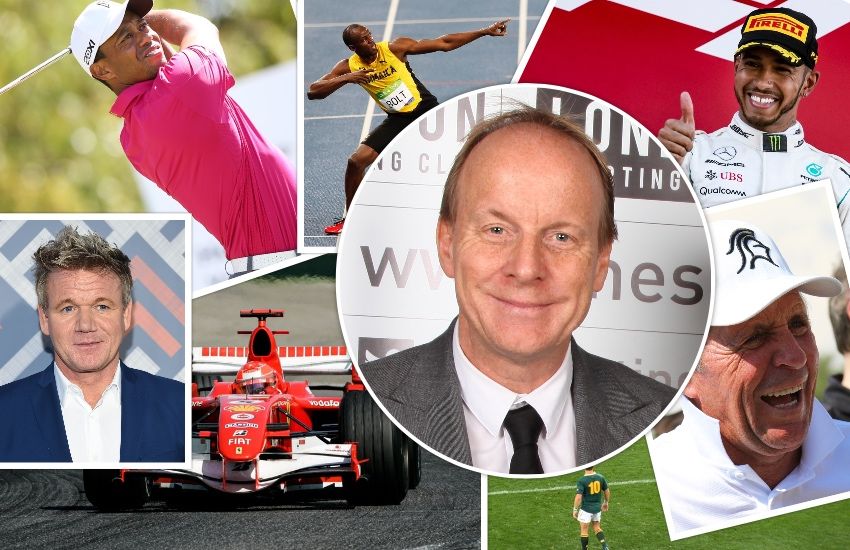

When Guernsey hosted boxing legend Sugar Ray Leonard earlier this month, I was afforded two opportunities. The first to hear the story of a multiple world title winner, the second to meet multiple award-winning journalist Ian Stafford.
While I had no particular interest in boxing, I was driven to attend the event by my fascination with people, and what creates winners in all walks of life. During the intermission, I brazenly approached Ian and asked if I could interview him. To my surprise, within a couple of weeks I was logged into a Zoom call with the man with an enviable career and “1,001 stories”.
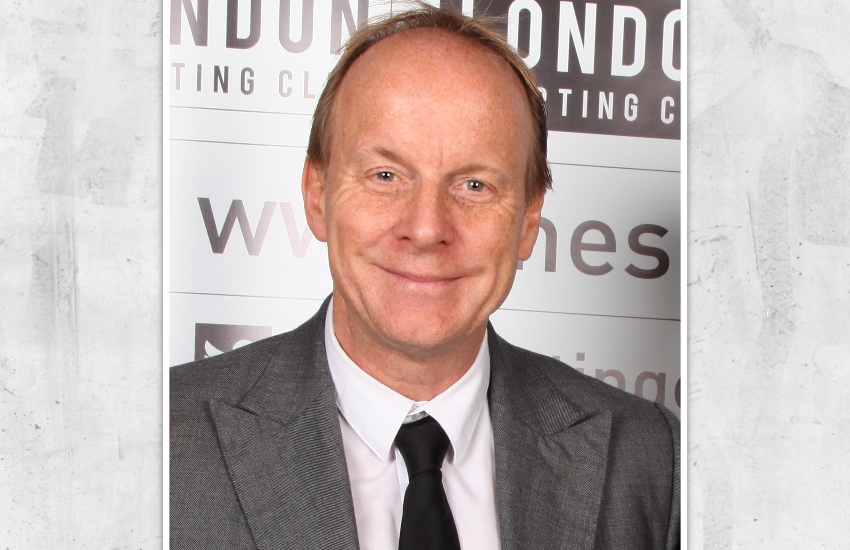
Pictured: Ian Stafford is the founder of The Sporting Club, a private networking club which values "good people, good business and good fun".
I quickly learned that Ian, who has interviewed and befriended many of the biggest names in sport, has an interview approach that matched my own. “Whenever I interview people, whoever they are, I’m 99% interested in the human being, rather than ‘tell us how you scored that goal’,” he said.
“I think the very best sportspeople are remarkable human beings. Not because they have a God-given talent to hit a tennis ball or kick a football; that’s a given. What differentiates the best from the very best is all about mindset.”
No stranger to sporting success himself, Ian has competed alongside the best sportspeople in the world. He boxed three rounds against Roy Jones Jr, played squash against Jansher Khan, ran the 60 metres sprint against the likes of Christopher Williams and Timothy Benjamin and partnered Sir Steve Redgrave at the Henley Royal Regatta.
Watch: Ian Stafford's "highlight reel" of some of his participatory events.
“Contrary to what you may have seen in footage of those events, I was a very good sportsman. I was on the first team for everything at school and I played county level for under-18s for several sports,” said Ian.
“At a public level, I was very good, but I was made to look borderline stupid against the best.”
Ian shared his experiences in participatory books, including ‘Playgrounds of the Gods: A Year of Sporting Fantasy’, which saw global success and provided a market for Ian to continue his sporting adventures.
“There were a couple of reasons for the participatory books. The first was to tell the athlete’s story. Secondly was to represent the man or woman who sits on their sofa with a beer in hand and criticises the sportsperson for dropping the ball or missing the goal. It’s not as easy as you think,” he said.
“It’s easy to watch the best, but you just can’t clock how good they are until you pitch them up against someone like me. The gulf between ‘pretty good’ at sport and being the best is miles wide.”
I asked Ian what it was like, as a clearly competitive man himself, to compete while knowing that he would lose.
“I don’t really do nerves or embarrassment. I like to laugh at myself a lot. I think it’s important not to take yourself too seriously,” he said.
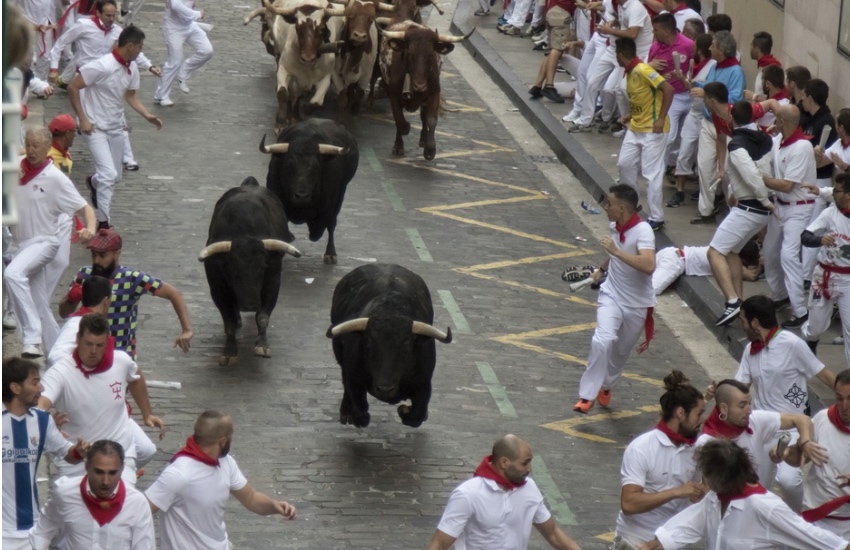
Pictured: Ian had a close call with a bull in Pamplona when a charging bull came close enough to snap Ian's wrist watch off.
Ian continued: “I remember visiting Steve Redgrave at his home after he agreed to let me partner with him for the Henley Regatta. I said I’d do my best but that it was unlikely we were going to win.
“I’ll always remember Steve had been holding a glass of water and he put it down, looked at me and said, “I don’t see why not”. I thought: ‘My God, he actually thinks we’re going to win, even with me in the boat’, but that was just his mentality.”
Ian said that if you’re going to be a sportsperson then “the aim is to win”.
“I’m not saying they would kill their grandmother or run over 12 ducklings on a zebra crossing in order to win, but in sport you need to have the mentality of winning above all else,” he said.
“The problem is that having that mentality can make you selfish and self-centred and can affect other areas of your life including relationships.
“The reason I like interviewing sports stars is because everyone knows who they are and has followed their stories, but the best reason is because they have the same skillset as the rest of us from a mindset point of view, it’s just exaggerated.
“They fail like we all fail and they succeed like we all succeed, but it’s magnified. When they fail, they fail bigger and the same goes for their successes.
“We all have times in life where we get knocked to the floor and we must get up. Or times where we try and do something and it doesn’t work. You either go back and either give up and quit or you make it work better.”

Pictured: Ian climbed Mount Kilimanjaro taking the shortest route due to time constraints in his schedule.
Over the last year, mostly as an unintended consequence of a boyfriend with a golf handicap of one, I have come to learn more about the dedication and mindset required to be the best, at whatever level, in sport.
“I remember once having Steve Redgrave as one of my guests for a Sporting Club [the private networking club Ian founded] event. A club member said they wouldn’t bother going because they were not into rowing,” he said.
“I said what needed to be understood was that Steve Redgrave has won five Olympic gold medals over 20 years. He was 40 when he won his last gold medal, in one of the most gruelling sports you can possibly play in and he earned hardly anything for doing it.
“For the last 15 years of his 20-year career, he had colitis, Crohn’s Disease, and type A diabetes. What does that tell you? It tells you that he’s a serial winner and that he’s created a no-excuses environment. That’s not about rowing, it’s about life and it’s about business.
“The man came along with three other guests. I saw him taking notes throughout the interview and at the end, he said it was one of the most inspiring afternoons he’s ever had.”
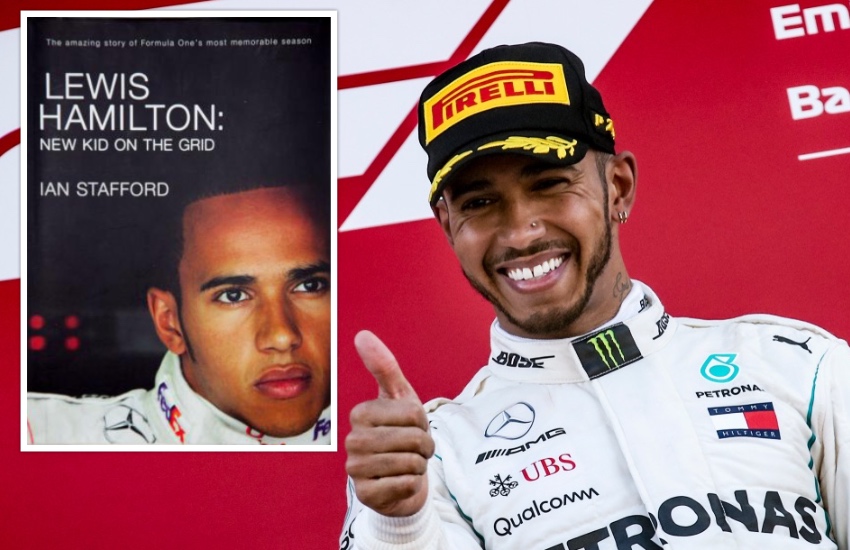
Pictured: Ian has written books about Formula 1 legends including Michael Schumacher and Lewis Hamilton.
It was clear from my conversation with Ian that the attributes he values, and is inspired by, in sports stars, including commitment and striving for perfection, are ones which he displays himself.
“I had always wanted to be a journalist. My mother was a national journalist in the ‘60s. I went to Kings College London and read history, primarily because it was a five-minute walk from Fleet Street, which was the home of UK journalism,” he said.
“I saw an opportunity to be a sportswriter for a national magazine called Sports Week, which was the UK’s intended version of Sports Illustrated in the US. I had no right to apply for the role; I was just out of university. I was a nobody.
“I applied and heard nothing. I applied again and heard nothing. I applied twelve times and eventually got a letter which politely told me to ‘bog off’.
“So, I phoned the office and got hold of a Welsh chief sub editor. I asked him about the editor and, after he’d told me a few things, I asked him to put me through to the editor.
“I said I was the guy who had sent 12 applications and I could tell by the tone at the other end of the phone that he was thinking I must be some kind of a stalker. I said I had a meeting opposite his office the following day, which wasn’t entirely true, and I asked if I could stop in and say hello for five minutes.
“I basically just wore him down. Eventually he said yes to the five-minute meeting. After an hour and a half, he offered me a job.”

Pictured: Ian's centre spread article about football hooliganism was read out in its entirety in the House of Commons.
Ian said that journalism could be described as “either a nasty world or an insecure world”.
“My back is full of knife wounds. It doesn’t matter to me at all. If you’re good at what you do, you do things the right way and you’re confident and secure about the way you go about things, then it doesn’t matter,” he said.
“When anybody in life disses people or has a go at people, unless they have a very good reason to do so, it reflects more on them than the person they’re criticising. Live and let live.”
As a journalist, it is impossible not to be inspired by Ian’s award-winning career, which has seen him reporting on some of the most momentous sporting events of the last few decades and interviewing the best of the sporting best.
Outside of his work, Ian has ticked off countless bucket list items including climbing Mount Kilimanjaro, completing the London Marathon, running with the bulls in Pamplona several times and completing the Cresta Run on 11 occasions.
He has dabbled in stand-up comedy at iconic Edinburgh Festival, disc jockeyed for Virgin Radio and been sous chef for Gordon Ramsey.
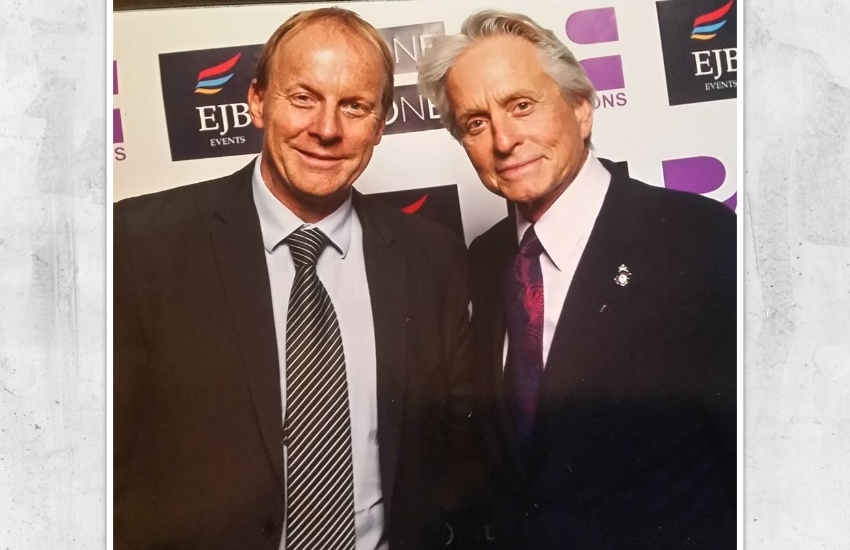
Pictured: Ian with Academy Award and Golden Globe winner Michael Douglas. (Credit: Ian Stafford Facebook page.)
“If I’m going to do something, I want to do it properly. I’m very conscious of the fact that I don’t want anything I do to appear as though it was a bit of a stunt,” said Ian.
“In Pamplona, I was nearly killed by a bull. He veered at the last moment but was so close to me that he took my wristwatch off with his horn.
“When you’re there, it’s for a week and you’re surrounded by all these American aficionados who are all friends-with-Ernest-Hemingway types. To be embraced by them, you can’t rock up and just run with the bulls once; it was men being men and it was a life experience.”
Ian said that it was important as a writer to be “very honest with yourself about what you’ve done”.
“When I write, it is fantastic because it’s all real. Fact is always better than fiction; you don’t have to make anything up or exaggerate or expand, it’s all there,” he said.
“When I was writing about boxing Roy Jones Jnr, it was a 5,000-word chapter. I wrote it in a day.
“I couldn’t get the words out quickly enough. There was so much emotion: fear, pain, anger and embarrassment. It was a wonderfully creative experience, even after getting punched in the face.
“I don’t ever put myself in a position where anyone could say that I did something purely for show.”

Pictured: Ian paired with five time Olympic gold medallist, Sir Steve Redgrave, in the Henley Royal Regatta.
Somewhat contradictory to his concern over his escapades being viewed as exaggerations of a blander truth, Ian said that he doesn’t concern himself with what other people think.
“It’s not about other people, it’s about me. I’m a perfectionist, not in everything I do, but certainly in my work. I don’t see anything wrong in that,” he said.
“You’ve got to strive for perfection. You’ll never get there, but if you strive for perfection you should achieve excellence.
“I’m not bothered by what other people think. In general, they are very kind and supportive; it’s nice, but you don’t get carried away with it. At the end of the day, I’m still an idiot.
“I remember Boris Becker once told me that, after he won Wimbledon at the age of 17, the next morning the very first thing he did was go and have a pee. The point being that nothing changed, he was still a human being.”
Despite his accolades, Ian said it is not his career that he would want his life to be measured against.
“When the end comes, I would want people to say that I was a good person who did my best to try to lead a good life and help people,” he said.
“The mantra of The Sporting Club is ‘good people, good business, good fun’. I think that’s important and I like to associate myself with good people who know that business needs to be win-win."
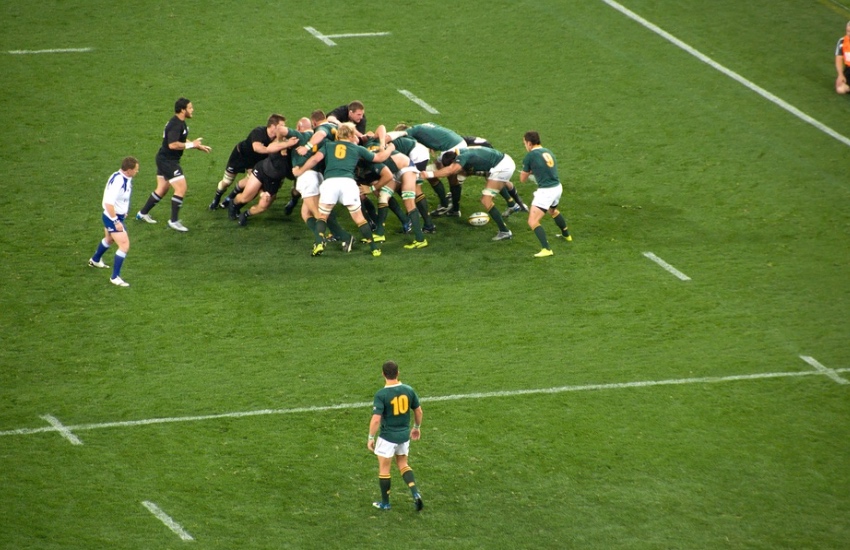
Pictured: Ian has substituted for the South Africa national rugby union team, the Springboks.
Ian continued: “It’s never been about the money for me; I’ve made money and I’ve lost money. It’s been about the journey and the adventure. I am one of the wealthiest people I know when it comes to life experiences. If you don’t have stories when you’re on your deathbed, then what have you been doing?”
Ian said he could have easily talked for ten hours about his “1,001 stories”. Time not permitting, I asked which story Ian would pick if he could only tell one.
I firmly believe that you can learn most about a person by what they volunteer to share without being restricted by a narrow question. Ian was no exception.
He decided to share the story of how he won his first journalism award.
“I still can’t believe that I did this. It was 1989, I was 25 years old and football hooliganism was at its height,” he said.
“Football hooligans had rampaged through Stockholm and ripped up a departmental store and the government said that was enough and they were going to stamp it out.
“The next month, England had to go to Poland for a game in which they needed to avoid defeat to qualify for the World Cup.
“I was writing for the Mail on Sunday at the time. I shaved my head, got some stick-on tattoos and tried to turn myself into a bit of a skinhead.”
Ian travelled to Poland on an official FA-backed trip and was surrounded by “National Front and BNP hooligans”.
“They were absolutely horrendous people, but I had to play along. One day, they discovered that Auschwitz was 20 miles away from where we were and they all wanted to go,” he said.
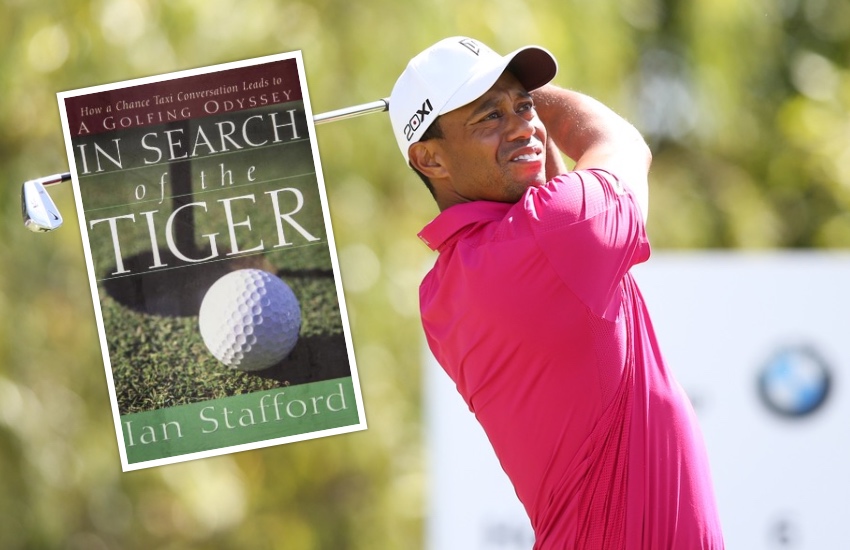
Pictured: Ian's book "In Search of the Tiger" tells his journey of learning to play golf and his goal to meet Tiger Woods.
Ian continued: “As a journalist you need to be very careful never to be seen to incite anything. It was especially important for a situation as delicate at that one was.
“Two of the group climbed on top of the roof of the gas chamber and started doing Nazi salutes. I took photos as surreptitiously as I could, then wrote about it when we returned home.”
Today, Ian’s article would have gone viral online. It achieved the equivalent of the time with a double-page centre spread in the newspaper.
“My article was read out word for word in the House of Commons as a way to demonstrate that the football hooligan problem had not been resolved,” he said.
“I had six months of death threats, but I was so proud of that piece. It wasn’t just another story about a footballer moving to another club, it was more important. I won Sports Journalist of the Year and, at the time, I was the youngest person ever to do so.”
Ian recalled another piece of his work which had a far-reaching impact in the sporting world.
“I had asked a very well-known coach to join me at Meadowbank [a stadium in Edinburgh]. We discussed his life story and then I produced a letter which had been written by him, prescribing testosterone, and other anabolic steroids to a couple of his athletes. I caught him red handed,” he said.
“I don’t care about people’s personal lives. I know an awful lot of stuff about personal lives that I’ve never written because I don’t care, but I’ve always believed that sport is life.
“If you’re going to cheat with drugs or on taking bets, then you’re toast. That won me another award because I’d revealed that this revered coach was nothing more than somebody who supplied drugs to his athletes.”

Pictured: Ian won his first journalism award documenting English football hooligans in Poland, including their visit to Auschwitz.
Clearly a man who holds himself to high moral standards, Ian said that he lives by the quote that “it’s nice to be important, but more important to be nice”.
“I know myself very well and I’m very comfortable in my own skin. It takes a while to understand yourself, but I do and there is nothing left that I need to find,” he said.
“I don’t need any more voyages of discovery; I’ve done all that. I know my strengths and weaknesses and what I want.”
I asked Ian if he liked the man he has come to know so well. He repeated my question back a few times while debating his answer. Surprisingly, Ian didn’t reach a conclusion, instead opting to consider whether he was liked.
“I don’t know if I like myself. I’m ok. I don’t have any major regrets and my conscience is clear. I have a decent reputation and haven’t made many enemies, which isn’t easy when you swim in murky waters full of sharks,” he said.
“It can be hard being me, both for myself and for others. I beat myself up quite a lot over the smallest things, but to my mind it isn’t the smallest thing.
“I’ve never really thought about whether I like myself or dislike myself. I can’t answer that, I think you’d need to ask other people.”
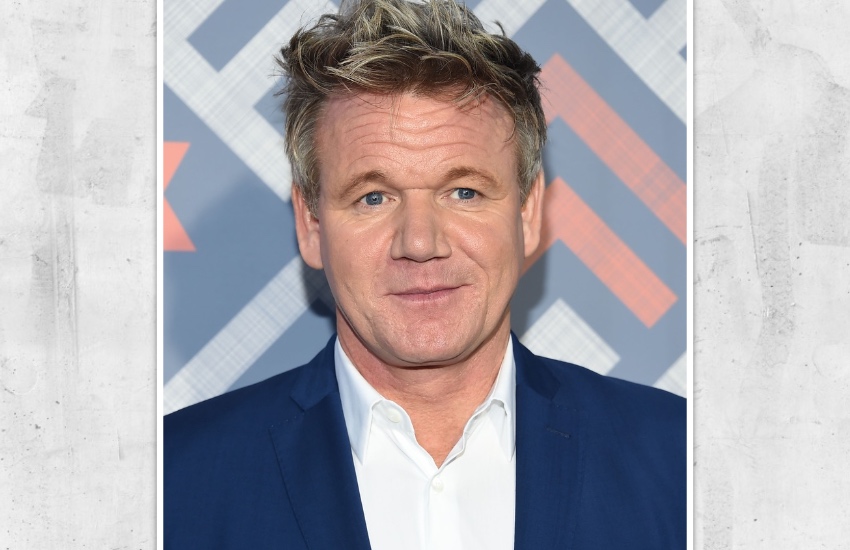
Pictured: Ian has been sous chef for Gordon Ramsay.
Ian’s reputation is certainly solid enough that his career shows no signs of slowing down, with interviews with golfing legends Gary Player and Jack Nicklaus on the horizon.
“I always pull people up if they say I’m only a sports interviewer; a good interviewer is a good interviewer,” he said.
“One of the important things is being able to quickly turn an interview into a fireside chat.
“Most of the people I interview have known me for several years. They know me, they trust me and they know I’m going to look after them. As a result, they’re prepared to go a bit deeper and that really helps.
“My life is my work and my work is my life. As Confucius said, if you enjoy your job you never do a day’s work in your life. I’ve never done a day’s work in my life.”
Interviewing Ian certainly didn’t feel like work and left me keen to hear the remaining 1,000 stories of his journey on the road less travelled. Whether I have gained his trust as an interviewer remains to be seen; the proof will be in the published pudding.
Comments
Comments on this story express the views of the commentator only, not Bailiwick Publishing. We are unable to guarantee the accuracy of any of those comments.